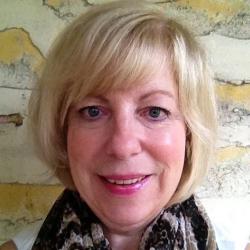Laura Hahn slips on a green apron with deep pockets and heads out to gather St. John’s Wort, and other herbs and wildflowers for the natural beauty and cleaning products she produces and sells.

First, she steps inside a trailer on the property to check on dozens of fluffy chicks that huddle and peep in the brooder. She stops to check in on her flock of broad-breasted white turkeys, some of which are spoken for by friends and family for Thanksgiving. Then she swings over to feed the pigs, Debbie and Becky. She climbs a small hill and heads into a wooded area to visit a vernal pond, a pool of water that will dry up as summer continues, but for now serves as a habitat for salamanders and frogs.
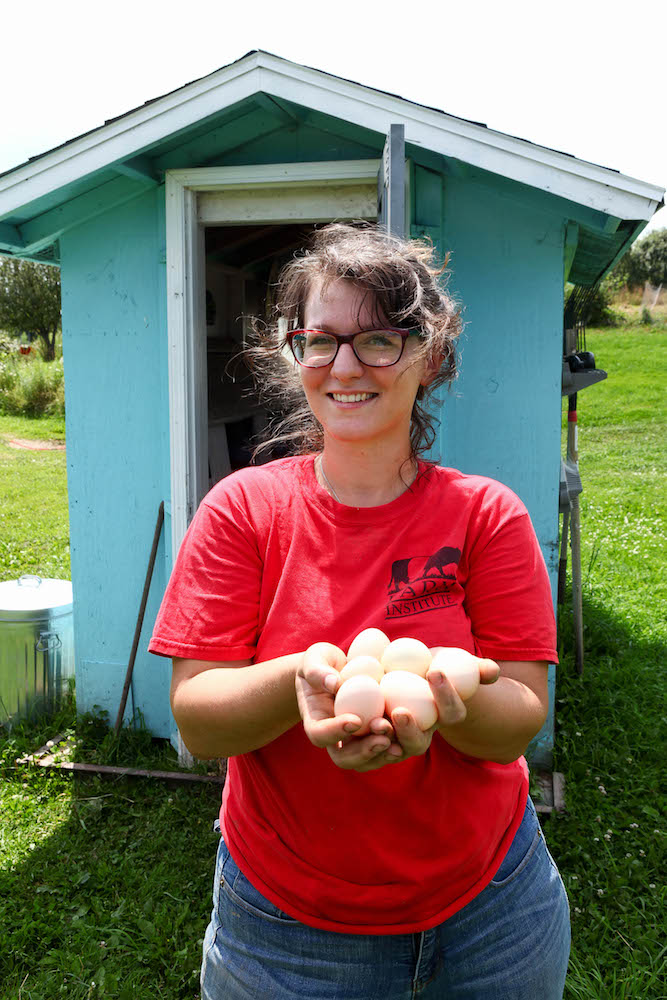
“This is one of my favorite spots on the farm,” Hahn says. “The sound of peepers in here was deafening in the spring.”
This is the rhythm of some of Hahn’s days at Little Yard Farm, which has transitioned from a “farmette” in Skaneateles Falls to a 25-acre property in Sempronius, Cayuga County, near the southern end of Skaneateles Lake. Hahn and her husband, Billy Meade, and their daughter, Geraldine, are living in a camper on the property while renovating a trailer for the family to live in. A striped tent on a hill, used for Geraldine’s first birthday party, marks the spot where they will eventually build a house.
Hahn, 29, an assistant chef at The Restaurant at Elderberry Pond, near Auburn, is living her dream of becoming a farmer. She grew up in Western New York and worked on dairy farms as a teenager before enrolling at SUNY College of Environmental Science and Forestry. She has worked at Lime Hollow Center for Environment and Culture in Cortland and Orenda Springs Experiential Learning Center in Marcellus. Hahn says her experience at Elderberry Pond, a certified organic farm also noted for its farm-to-table, fine dining restaurant, has helped her more sharply define what she wants to do.
She and her husband searched farms for sale on Craigslist and sat in silence looking at the Sempronius listing for a while before talking it over and making an appointment to visit. They can see past the overgrown orchards and endless to-do list to envision a small family farm with a focus on pastured poultry and pigs.
Down the road, she would like to add goats to help manage the land, a couple of beef cows, and campers or tents to offer a fresh Airbnb option in the country. But one step at a time.
“You only get one shot at things like this,” Hahn says. “We decided to take it. I like the wildness of this place. I think you can farm in many ways and this is how I was meant to farm.”
As the primary operator of Little Yard Farm, Hahn joins the sisterhood of farmers in Central New York. Attend any local farmers market and you see them, talk to them — and purchase your vegetables, eggs, cheeses, meats, breads and more from them.
Less than 20 percent of the operators of New York state’s 35,500 farms are women, according to the 2012 Census of Agriculture conducted by the U.S. Department of Agriculture. They milk cows, drive tractors, grow vegetables and fruit, raise animals for meat, witness life and death, make critical business decisions and serve as stewards of the land. They work 365 days a year, always at the mercy of the weather, and go without days off and vacation, sometimes for years.
“Farming is a way of life,” says Maureen Knapp, co-owner, of Cobblestone Valley Farm, in Preble. “It’s much more than a job or an occupation in that the work is literally never ending, so everything is just woven into the daily lives of those that choose to farm. Farmers love what they do, or else they wouldn’t be farmers.”
Hahn says the most challenging aspect of farming at this juncture is finances. They’re selling one house and making renovations to another while also making improvements to the farm.
“The start-up costs are huge,” she says. “We’re lucky we already purchased some equipment and we were lucky enough to find land for a decent price and it had a barn on the property. I don’t want to start out with a huge amount of debt hanging over our heads.”
She’s excited to join the list of local women farmers — and inspired by them. “It’s amazing the number of women here who are farmers,” Hahn says. “They’re not helping on a farm or assistants to their husbands. It’s their farm. That’s really encouraging and exciting. It’s wonderful to have these role models.”
Maureen Knapp, co-owner, Cobblestone Valley Farm, Preble
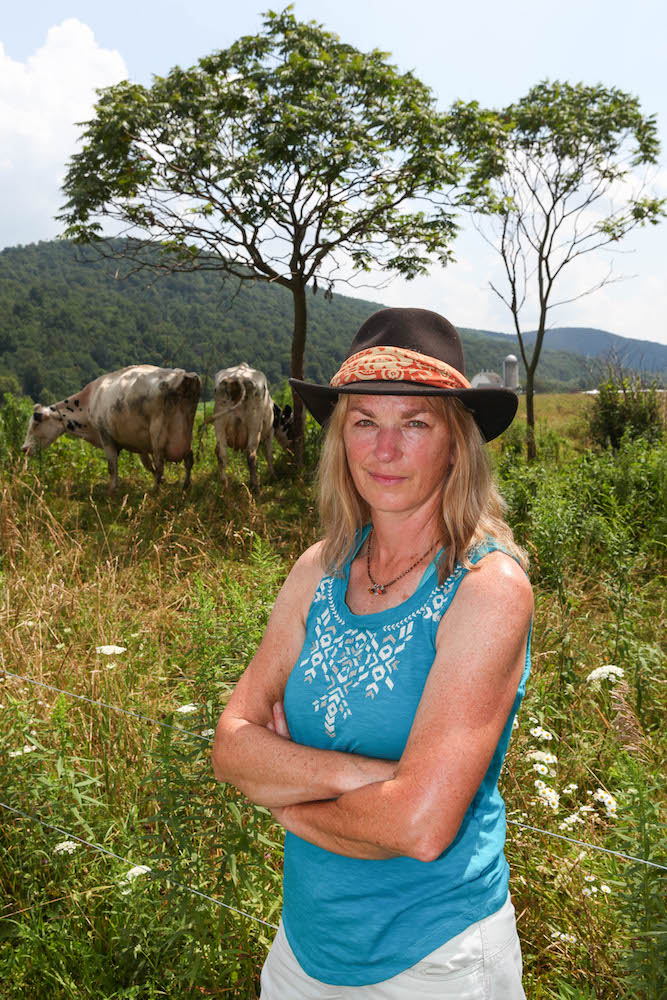
Maureen Knapp, 57, believes she was born to farm. As a child she loved dirt, insects, horses and being outdoors. Later, she would fall in love with a farmer and fully embrace the farming way of life. Together, she and her husband, Paul, have created Cobblestone Valley Farm, an organic farm in Preble. Dairy is the backbone of the farm (their milk goes to Organic Valley, a farmer-owned cooperative), but they are also known for their organic strawberries, organic pastured poultry and pork and grass-fed beef.
Knapp says farming has its frustrations, including being at the mercy of the fickle Central New York weather and being pulled in many different directions on any given day. But she adds that farming has taught her to “go with the flow, and always have a Plan B.”
What inspired you to become a farmer?
I get the sense that it was an inborn thing in my case, but my gateway into farming was definitely horses. I’ve had the horse bug since I can remember, and that just naturally expanded out to include other animals and living things. I distinctly remember at some point in grade school learning about how manure from farm animals was spread back on the land as fertilizer for the soil. Learning about that process really resonated with me in that you could take something that is inherently thought of as waste, and turn the table right around on it so that not only was it not- waste, but that simple action could perform a wonderful service for the earth.
Are people surprised to learn you’re a farmer?
I suppose so. Mostly, I think, there are so few farmers these days that finding a farmer — male or female — is a lot less common than it used to be, as we are now down to 1 percent of the population in this country. If you think about the implications of that number, it’s a bit scary.
What are the biggest challenges, physical and otherwise, of the job?
Because we are at the mercy of the weather, and also so dependent upon the weather, the challenge is learning how to live with the weather, as it can make us or break us. A great example of that is the wet cycle that we’ve been in since May.
As a woman it is sometimes frustrating that I am not physically stronger than I am, and at times need to rely on extra help for the simple reason that my testosterone level is lower than Paul’s. As a mother, being pulled in so many different directions — between the kids, the household, farm chores — can be exasperating, but learning to think things through, how to prioritize, and ultimately how to accept that less than perfect is perfectly fine, is the reward.
What are the biggest rewards of farming?
There are many, but for me, probably the biggest is our customers. We do a considerable amount of direct marketing from the farm and our customer base is just incredible; they keep us going, on many levels.
The food that we produce here is not inexpensive, and our customers recognize that we are working from a different production model, which takes much more into consideration than just price. They recognize that, and are willing to support it with their hard-earned money, along with the time that it takes for them to make a trip to Preble.
What’s your best advice for other women considering a career in farming?
The best advice I can give for anyone considering farming is to work on a farm. Learn about farming, and get paid to do it. You’ll know fairly quickly whether or not you are cut out for the life.
Take your temperament into consideration. There are many things going on simultaneously on a farm, and plans change frequently when something goes wrong, such as equipment breakdown, somebody didn’t close the gate, weather changes. Therefore it is almost a requirement that you are able to let go of the original plan, go with the flow and always have a Plan B ready. At the end of the day, you need to be able to focus on what you got done that day, not what you didn’t get done.
Patricia “Tricia” Casper Park, co-owner, Creekside Meadows Farm, New Woodstock
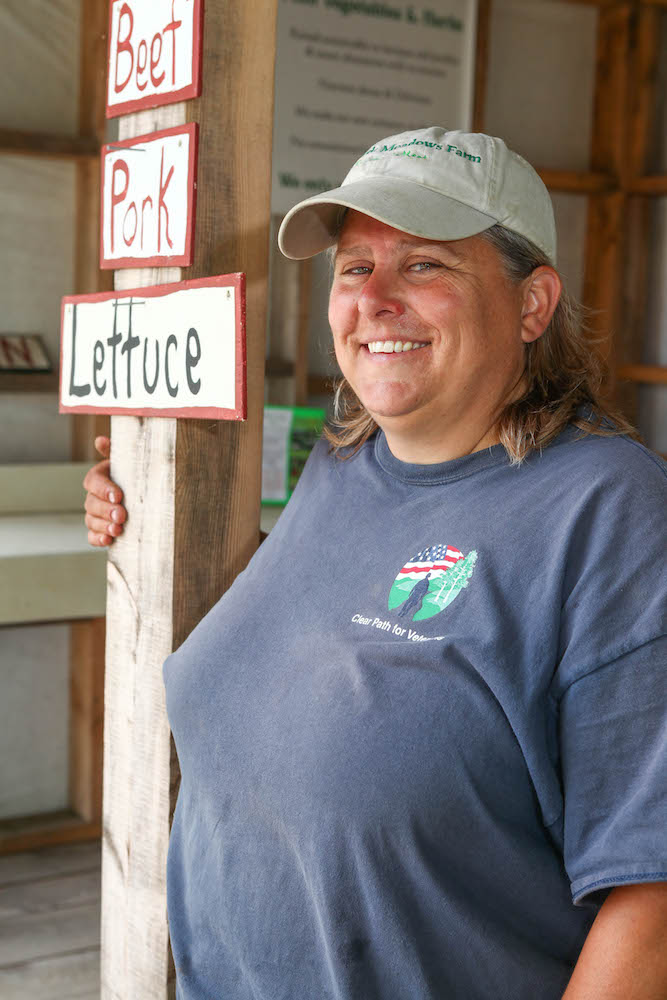
When Tricia Casper Park and her husband, Matt, started their first farm, in Tully, her only exposure to agriculture was helping out in her mother’s home garden. They started out small, with vegetables and a couple of cows, then gradually added chickens, more beef cows, a couple pigs and turkeys. They sold eggs and their pasture-raised meats to family and friends and found themselves with an appreciative and growing audience. Before long, they needed more land.
Park, 48, now co-owns and operates Creekside Meadows Farm, a 150-acre, diversified family farm, in New Woodstock. She manages daily farm operations with help from her son, Cameron, and from her husband, on weekends.
In addition to pasture-raised meats sold direct from the farm and at local farmers markets, Creekside Meadows offers produce, maple syrup and handmade farmstead soaps. In her “spare time,” Park, a veteran of the U.S. Air Force, volunteers in the kitchen at Clear Path for Veterans in Chittenango. She also makes time to mentor fellow women farmers and encourages them, as she did, to make use of resources like Cornell Cooperative Extension’s Northeast Beginning Women’s Farmer Project.
What inspired you to become a farmer?
People who loved our products and wanted more, so why not make it a career and lifestyle?
Are people surprised to learn you’re a farmer?
Yes, they are shocked, especially anyone from high school! Most knew I had been in the military and was a volunteer EMT and firefighter but farmer? Ha! Nope! I had zero experience except my mom’s home garden and nothing to do with livestock even growing up around dairy farms.
What are the biggest challenges, physical and otherwise, of the job?
It’s always something different. Sure, some things are the same but change happens, we are on our toes making decisions, changing plans and trying new things. Farming is an extremely physical job, no way around it. We work every year to find ways to do things easier, more efficiently, to take the physical stresses and minimize them when we can because we want to do this a long time. Save those knees and hands and backs for the long run.
What are the biggest rewards of farming?
I am my own boss. I make my own life, my own decisions and plan where my business is going to go. I also like the mental challenges of having a plan, monitoring the plan and making adjustments as we need to — or, in some cases toss out Plan A and figure out the best way to implement Plan B.
I also love growing things. It doesn’t matter if it’s the pasture grasses, the livestock, the flowers, the veggies, I just get so much from that bit of nurturing. Some days, I have to stop and remember that. I have to sit down and breathe it in, listen to the land, listen to the wildlife, the wind, the water and calm my mind down before moving onto the next thing.
What’s your best advice for other women considering a career in farming?
I was chatting with a fellow woman farmer I helped train in holistic management what her advice was and we both agreed: It’s why do you want to do this?
Seriously, what makes you want to face mental and physical stresses where you are the decision maker all the time, where you are working with or against Mother Nature (she’s pretty cranky lately), where the failure rate is higher than just about every other start-up business, where the suicide rate is so high, where profit margins are so crazy slim, where customers love you, adore you, and really appreciate what you do but then there are some that just bash what you do.
It’s a field where things live and die sometimes in seconds, where, in our case, we are responsible for hundreds of lives at any time on our land. It’s tough but it’s something that we love. Love isn’t going to get you through it all. Dig deep and figure out what drives you to live your life they way you do, what your core values are, what you want your life to be like now and in the future, how you want to manage your responsibilities and how you are doing to do all of it.
Meg Schader, co-owner, Wake Robin Farm, Jordan
Meg Schader, 41, grew up in Elbridge and says she was “bit by the farming bug” at Cornell University, where she earned her bachelor’s degree in agriculture. She met her husband, Bruce, in 1997, when she volunteered on a farm he was operating with a friend in New Hope. She moved to the farm in the spring of 1998 and grew cut flowers there that season.
A year later, Meg and Bruce married on the farm, but departed after a falling out with Bruce’s business partner. Bruce Schader “plowed up some land his parents own in Jordan,” Meg Schader recalls, and that is how Wake Robin Farm got its start.
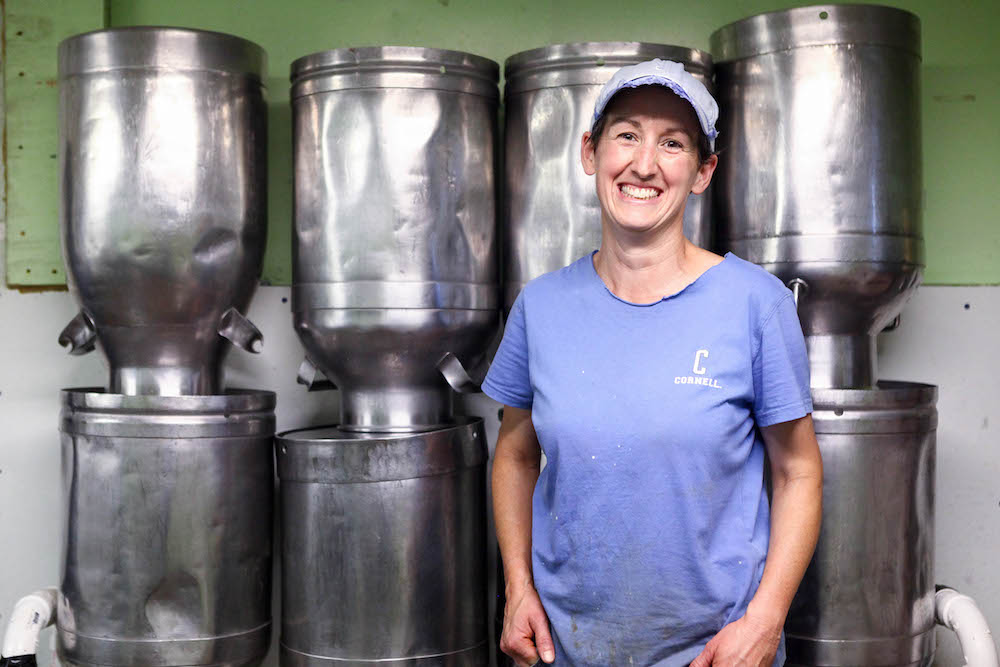
The Schaders grew organic vegetables from 1999 to 2006, increasing their business to a 160-member CSA (community supported agriculture) in the process. In 2006, they purchased four cows, built their creamery and transitioned to dairy processing. The Schaders, with their teenage son, Hugh, are a fixture every Saturday at the Central New York Regional Market in Syracuse, where they sell their yogurts, farmstead cheeses, milk, homemade artisan breads and other baked goods.
Every day on the farm is different, but the Schaders have come up with a system that works well for them. “Bruce and I milk our cows together and share the field work,” Meg Schader says. “He takes care of all the processing and mechanical work and I am in charge of packaging, marketing and bookkeeping.”
What inspired you to become a farmer?
I was very interested in the concept of sustainable agriculture, so I came to farming as an environmentalist. I remember sending Bruce a letter from college, telling him I wanted to convert all the farms in the area to organic. He set me straight pretty quickly and I’ve learned that it’s much more complicated than I originally thought.
Are people surprised to learn you’re a farmer?
Yes, people who meet me for the first time are often surprised and interested in what I do. When I did yoga teacher training at Kripalu a few years ago, there weren’t any other dairy farmers in my class. I think what surprises people most is that I’m a vegetarian dairy farmer. I’m kind of a rare bird in that way.
What are the biggest challenges, physical and otherwise, of the job?
The biggest challenges are the physical risks, the financial unpredictability and being here twice a day to do chores. Our business depends on our health, so we try to eat really well and take care of our bodies. But things happen, like when Bruce injured his arm a few years ago.
It’s tough to be so tied down. Bruce and I have spent one night off the farm in the last 10 years. We don’t get vacations together, but I am able to get away for a few days a couple times a year while Bruce and Hugh hold down the fort.
What are the biggest rewards of farming?
The customers who appreciate what we do, working close to the land and with my family and doing work that feels important to me. It’s impossible for me to do a job I don’t believe in. I’ve tried it, and although I’m sure I could make more money doing something besides farming, I want my work to matter.
What’s your best advice for other women considering a career in farming?
Know what your priorities are, be willing to make a lot of sacrifices and be ready to wear many hats!
Lacey Scriven Cashman, co-owner, Mountain Grown Farm, Jamesville
Mountain Grown Farm is a small, non-certified organic family farm and vineyard with a focus on heirloom vegetables and hybrid vegetables not normally found in grocery stores.
Co-owners Lacey and Kevin Cashman moved to Central New York in 2009 and brought their first produce to the Cazenovia Farmers Market in 2010. They met at Colorado State University, where they both studied science, and they have a deep appreciation for plants and the science of growing things. This year, they added their first high tunnel for year-round growing and are also adding a barn and wash building.
Lacey is the face of Mountain Grown Farm. She sets up shop each week at the Cazenovia market and at the Fayetteville Farmers Market, where she serves as market manager. On the farm, she starts the seeds each season, plants, transplants and irrigates. Kevin is the heavy machinery operator, mechanic, builder, bed preparer, cultivator and weeder.
The harvest is a shared labor. “The best results are when we can do things together,” she says. “Other times, it’s divide and conquer.”’
What inspired you to become a farmer?
We both have a passion for plants and growing them, foraging wild plants as well. We both hate the produce in the supermarket, so old with no flavor. We know that food that’s eaten right out of the garden is so much better. (We had a) desire to be entrepreneurs and start a winery.
Are people surprised to learn you’re a farmer?
I guess we don’t get out much! People mostly know us as farmers.
What are the biggest challenges, physical and otherwise, of the job?
We’re not as young as we used to be; so much is physical. We sound like a couple of 80-year-olds in the morning! Trying to find ways to work smarter, with less exertion. Everything — equipment, seeds, tools — is incredibly expensive.
What are the biggest rewards?
Working together and hearing from happy customers.
What’s your best advice for other women considering a career in farming?
You need to understand the farm will take over your life, and that of your immediate family as well. (You) can’t leave, especially if you have animals, but plants growing are just as needy. We have a great commute and office, but need to find balance. It’s also good to have lots of money to invest; it takes a lot more than you have.
Madeline C. Smith, owner, Hungry Soul Farm, Pennellville
Hungry Soul Farm is an 86-acre CSA farm, with a roadside stand offering fresh vegetables and eggs. The farm is the vision and dream of Madeline Smith, but it’s truly a family operation.
Smith launched the farm in 2011 with assistance from her husband, parents and brother, all of whom play key roles. Smith handles the marketing, finances, equipment, procurement of materials and overall strategic plan for the farm. Her mother cares for and manages the 100 chickens and ducks that provide fresh eggs. Her husband, Marcus, who works off the farm, keeps bees and does much of the heavy lifting. Her father builds things and fixes everything that needs fixing. And her brother helps with a roster of tasks, including starting seedlings, weeding and managing and harvesting crops.
“I call myself the boss, but most of what we do is decided and planned together,” Smith says. “Our goal as a family is first to enjoy what we do. We need to be profitable, but not at the expense of our minds and bodies.”
Smith, 35, is a graduate of SUNY College of Environmental Science and Forestry, where she earned a bachelor’s degree in construction management. She’s also the mother of a 3-year-old son. She has worked in office settings, but felt that something was missing in her life. Farming is financially challenging, she says, but it satisfies her belly, heart and soul.
What inspired you to become a farmer?
I became a farmer to supply my family and community with fresh, chemical-free food. Once I started to learn about the issues in the food industry, I had to be part of the solution. I also realized I needed a job that kept me moving. I feel healthier and this work feeds my soul in a way I have not found anywhere. Hence the name, Hungry Soul Farm.
Are people surprised to learn you’re a farmer?
Probably not.
What are the biggest challenges, physical and otherwise, of the job?
Finances are the only really challenge in farming for me. You find a way around it, work with what you have and become creative. It’s an expensive operation, and the return is just not there. But we do it because we love it.
What are the biggest rewards of farming?
The joy I find in every piece of farming cannot be matched by any job I have done in my life. The creation is amazing: starting seeds, watching them grow and finally a vegetable! My body feels better. At a desk job, I could feel myself dying. Self-care seemed out of my reach. As a farmer I feed myself well, allow rest when needed, work my muscles to their full potential and my heart is full.
What’s your best advice for other women considering a career in farming?
Don’t expect yourself to be able to do it all. A great team around you makes short work, particularly in terms of raising children and farming. Providing full-time care for your child while trying to build or run a farming operation is no small task. Give yourself a break and adjust your expectations.
To view more of Michael Davis’ photos from this story click here.
MORE INFORMATION ON THE FARMS
Little Yard Farm: littleyardfarm.com/about
Cobblestone Valley Farm: cobblestonevalley.com
Creekside Meadows Farm: creeksidemeadowsfarm.com
Wake Robin Farm: wakerobinfarm.org
Mountain Grown Farm: mountaingrownfarm.com
Hungry Soul Farm: hungrysoulfarm.com/index.html
Margaret McCormick is a freelance writer and editor in Syracuse. She blogs about food at eatfirst.typepad.com. Follow her on Twitter, connect on Facebook or email her at [email protected].



